
Have you ever needed to quickly make your columns the same width in a Google spreadsheet? There is a very simple way to evenly space columns in Google Sheets, that will allow you to quickly expand or shrink multiple columns to the same width at one time. In this article I will teach you how to do this quickly and easily, with two different methods.
To distribute columns evenly in Google Sheets, follow these steps:
- Select the columns that you want to evenly space
- Right-click on the top of one of the selected columns, then click “Resize column…”
- Enter the new column width in pixels (Default is 100), then click “OK”
- Optional shortcut: Hover your cursor at the very top of one of the select columns, over the barrier that separates two of the columns (Cursor will turn into arrows that point left and right). Then click and drag your cursor left or right
Scroll down to check out the detailed examples and see a variety of ways that you can use this handy trick.
There is also a way to automatically resize multiple columns at once, so that each column fits the longest piece of text in the cells. If you want to learn how to do this, check out this article: “Automatically resize columns in Google Sheets”
This article focuses on how to make columns the same width in Google Sheets, but you can click here to read the Microsoft Excel version of this lesson.
Click here to get your Google Sheets formulas cheat sheet
Below, is a more detailed set of instructions, along with several examples.
How to make columns the same width
There are two ways to quickly make columns the same width in Google Sheets.
Both methods will require you to select multiple columns at once, so just in case you don’t know how to do this I will show you right now.
To select multiple columns before adjusting their width, use any of these methods:
Option 1: Click on the top of the first column that you want to select, and while holding your mouse click, drag your cursor right until every column that you want to select is highlighted, then release your mouse click
Option 2: Click on the top of the first column that you want to select (release click), then while holding the “Shift” key on the keyboard, press the right arrow until you have selected all of the columns that you desire
Option 3: While holding the “Ctrl” key on the keyboard, click on each individual column that you want to select (This will allow you to select non-adjacent columns)
Now let’s go over our first example, and while doing so I will give more detail than I did in the basic instructions above.
Use either of the methods listed below to make the columns the same width. Personally I prefer the click and drag method most of the time, unless there is a certain reason why I need to precisely set the column width in pixels.
Method 1: Right-click and choose “Resize column…”
Right-click on one of the columns that you selected, and after the menu pops up, click “Resize column…”
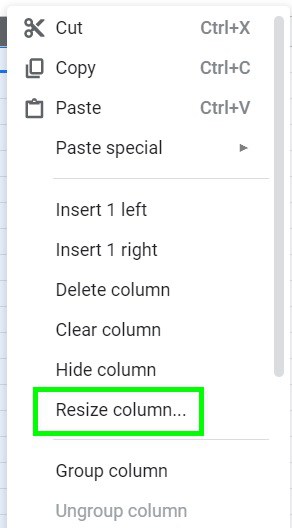
When a new menu pops up, enter the new column width by typing a number of pixels. For reference, the default column width is 100 pixels in Google Sheets.
Click “OK” and the width that you set in pixels will have applied to all of the columns that you had previously selected.
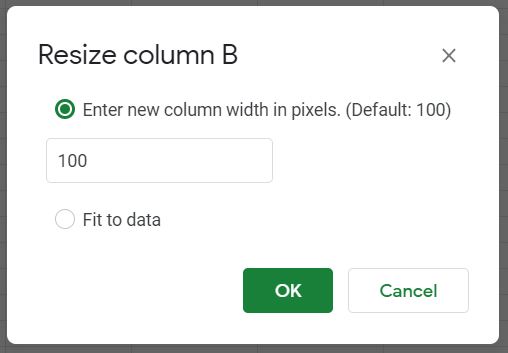
Method 2: Click and drag
Hover your cursor at the top of the selected columns, on the vertical line separating any two of the selected columns. When your cursor is in the correct place to adjust columns, your cursor will appear as two horizontal arrows.
Now click and drag your mouse to either expand, or shrink the columns. Dragging the cursor right will expand the columns, and dragging your cursor left will shrink the columns.
The picture below shows columns in Google Sheets at their default width. I have put borders on the cells to make the cell size easier to see. We will use this click and drag method to shrink these columns, so that each column is the same width.
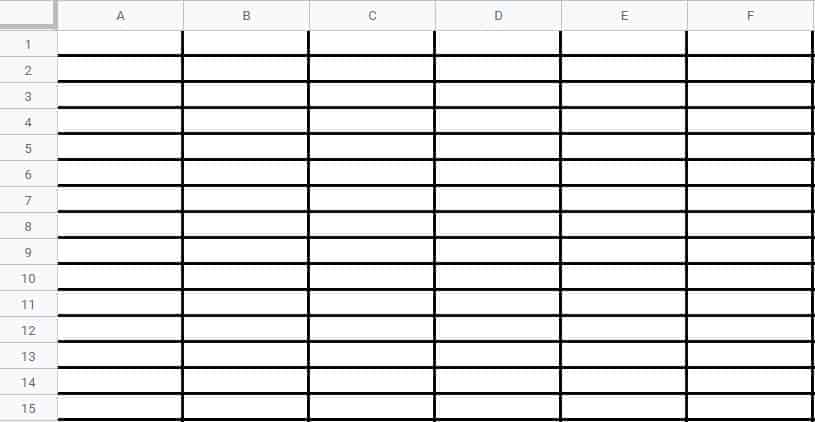
To shrink the columns in this example to the same width, follow these steps:
- Select columns A through F
- Hover your cursor at the top of the columns, on the line between columns A and B
- Click and drag your mouse to the left, until the columns are about half as wide as they were before
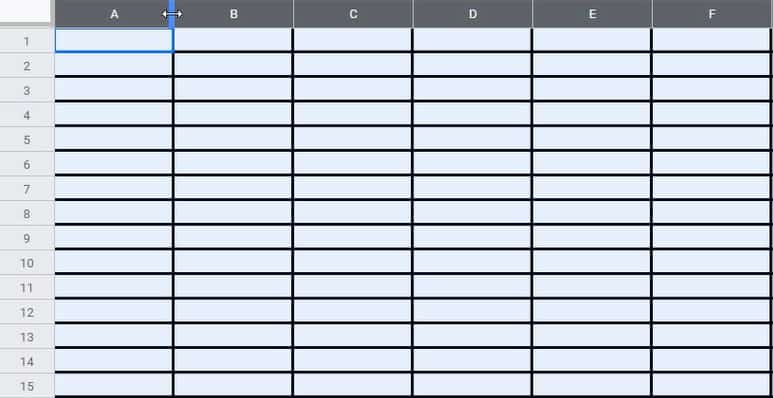
The picture below shows what your sheet should look like after following the steps above. As you can see the columns are much more narrow, and are all the same width.
To do this we used the click and drag method, but if you wanted to you could have also set the column width to 50 pixels, by using the right-click menu method that was described above.
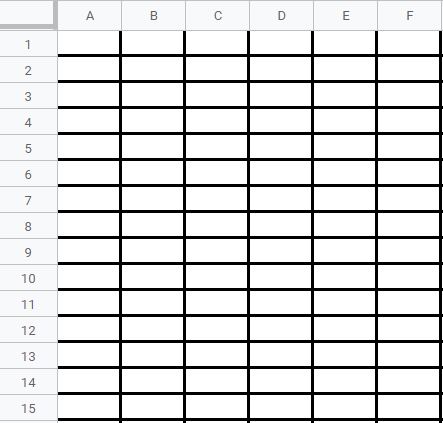
For the rest of the examples in this lesson, I will use the click and drag method, as this is the easiest way to evenly space columns.
How to evenly space columns to fit the data in the cells
Now let’s take a look at an example of evenly spacing columns when there is data in the cells.
A situation where you may find the need for evenly spacing columns, is when taking attendance in a spreadsheet, where you want to narrow each of the columns quickly, and to the same width.
As you can see in the image below, the attendance data is widely spread and would look better if the columns were more narrow.
To evenly space the columns in this example, follow these steps:
- Select columns B through I
- Hover your cursor at the top of the columns, in between two of the selected columns
- When the horizontal arrows appear, click your mouse and then drag your cursor left
- Release your click when the columns are at the desired width
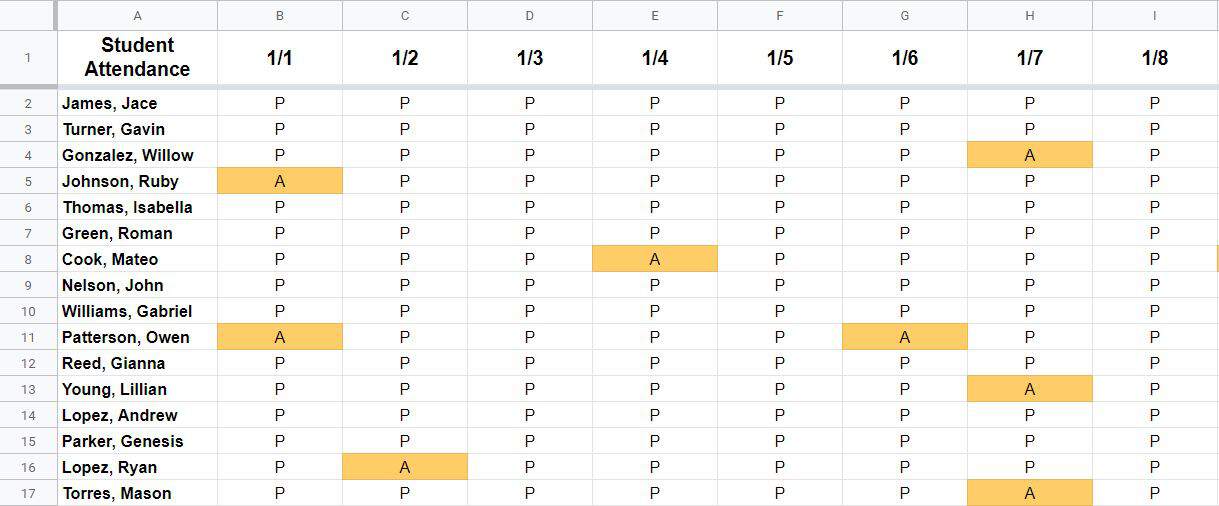
After selecting and adjusting columns B through I as described above, the attendance data will look like the image below.
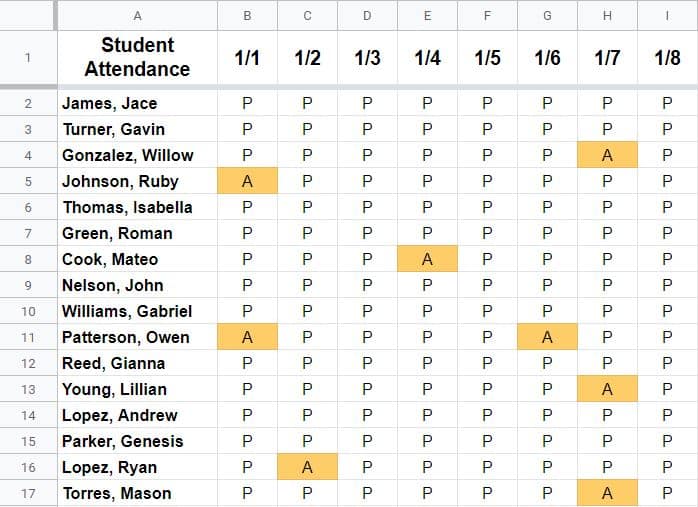
Now the columns that contain dates and attendance marks are more narrow/compact, which allows you to easily view attendance trends.
Narrowing the columns as explained above can also help you to fit more data in the same view!
Selecting all columns quickly
In this example, we will resize all of the columns so that they are the same width. Below the images show “Time” data that was recorded by multiple people, for multiple time trials.
As you can see the text is too large to fit inside the cells, and so we want to expand the columns, but make sure that they are all the same width.
To do this follow the instructions below.
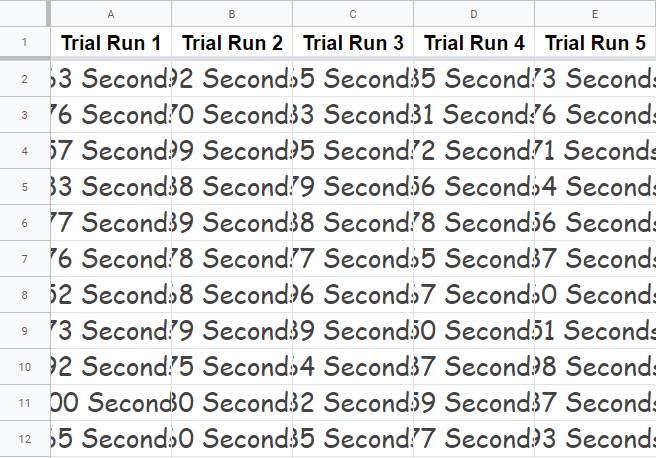
To select all of the columns & rows in a Google spreadsheet, click inside the square at the upper-left of your spreadsheet as shown in the image below (Click the square that is above row 1 and to the left of column A).
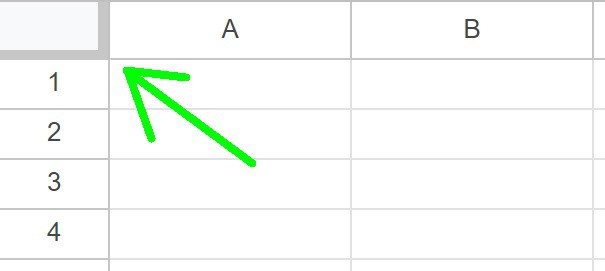
To select all of the columns using a keyboard shortcut in a Google spreadsheet, press Ctrl + A on the keyboard.
Below is another method that you can use to select columns quickly.
To quickly select multiple columns in Google Sheets, click on the top of a column, then while holding the “Shift” key and the “Ctrl” key on the keyboard, press the left or right arrow key until all the columns to the left / right are selected (this method selects multiple columns each time you press the key, depending on the data that is in the cells. If no data is in the cells it will select all columns to the left / right). If you only hold the “Shift” key, without the “Ctrl” key, you can quickly select columns one by one by either tapping or holding the left or right arrow keys.
You can also use any of the column selection methods mentioned in the beginning of this lesson if you prefer.
To resize all of the columns in this example, follow these steps:
- Select all of the columns in your spreadsheet, or all of the columns that you want to adjust
- Hover your cursor over the vertical line between two of the selected columns, at the very top of the columns. (This will cause your cursor to appear as a set of arrows, as shown in the image below)
- Click your mouse, and while holding your click drag your cursor right until you reach the width that you want all of the columns to be, then release your click
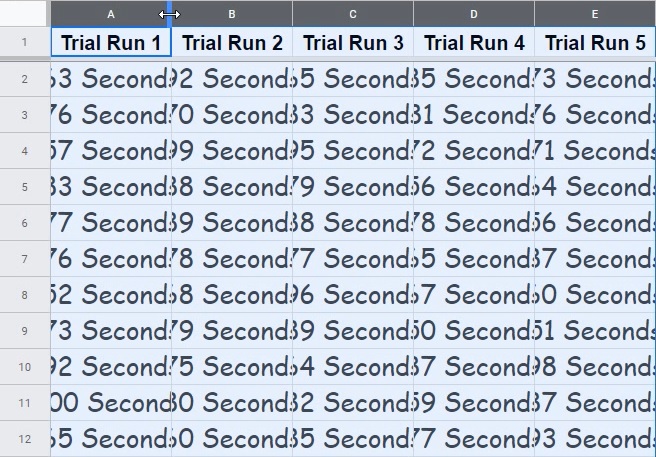
After completing the steps above, the columns in your spreadsheet will look like the columns in the image below.
Now the columns are much wider, they are all the same size, and the text easily fits inside the cells.
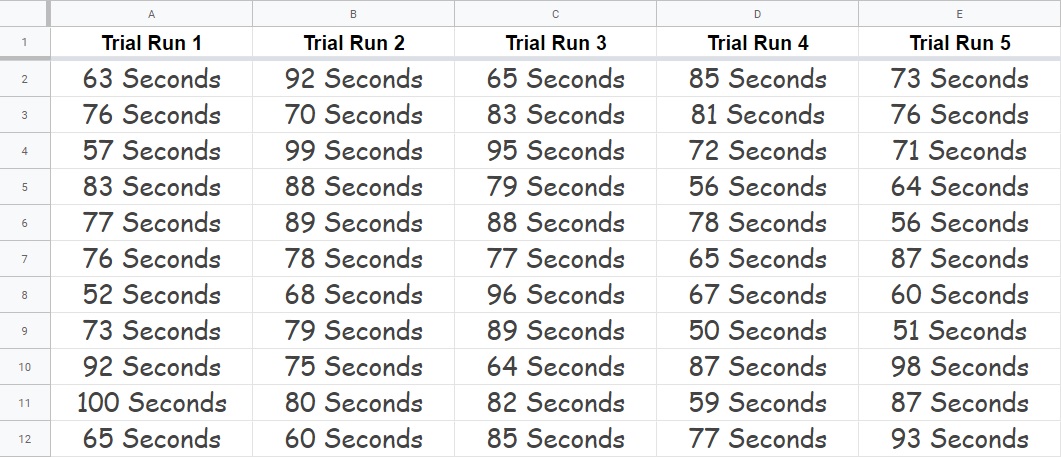
How to evenly space multiple non-adjacent columns
If you ever need to, you can also evenly space multiple columns at once that are not adjacent.
Let’s go back to using an example that has attendance data, but this time we will specially format the columns that represent the days of the weekend (Saturday and Sunday).
Keeping columns in your attendance sheet that represent weekend days, and formatting them in a unique way… will allow you to automatically fill a sequence of dates across the top of your spreadsheet, instead of having to struggle with creating a miniature series of dates for each work week. This will also allow you to mark any attendance activity on weekends if needed.
As you can see in the image below, after every five days of recorded attendance, there are two columns that follow which are completely black, which visually separate each work week. This looks good as is, but it would look much better if the black columns representing Saturdays and Sundays were narrow.
Rather than trying to individually adjust each column to make it the same narrow size, we can simply select all of the black columns and then adjust them all in one action.
To do this follow the instructions below.
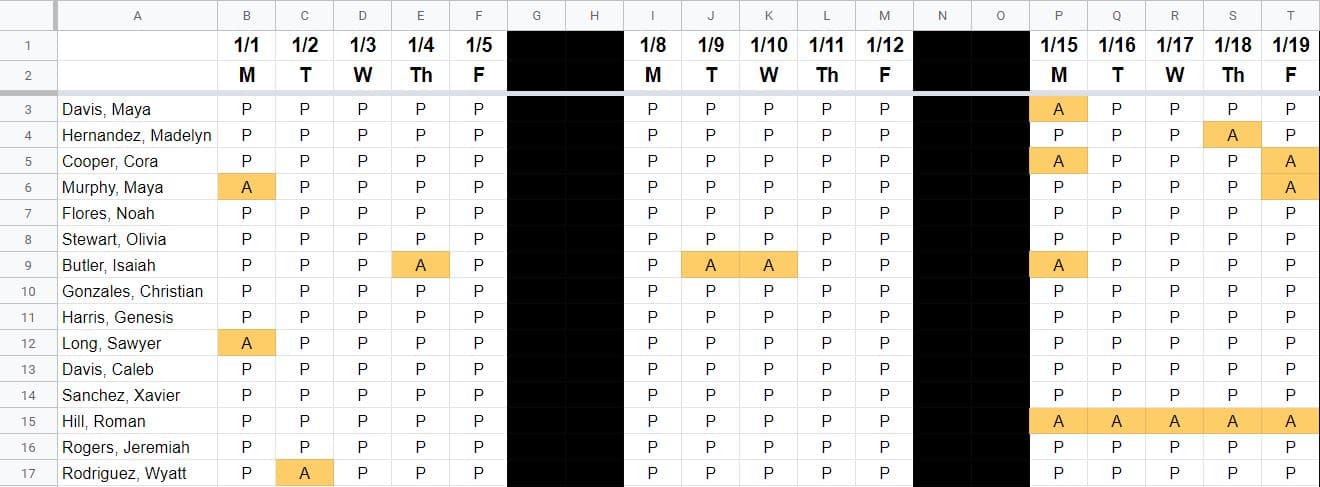
First, let’s make sure that you know how to select multiple columns that are not right next to each other.
To select multiple non-adjacent columns in Google Sheets, do this:
- While holding the “Ctrl” key on the keyboard, click on each individual column that you want to select
To adjust the non-adjacent columns in this example so that they are more narrow, follow these steps:
- Select columns G, H, N, and O
- Hover your cursor between columns G and H, at the very top of the columns
- Click and drag your cursor to the left, until you have reached the desired column width
- Release your click, and each of the selected columns will have adjusted to the same narrow width
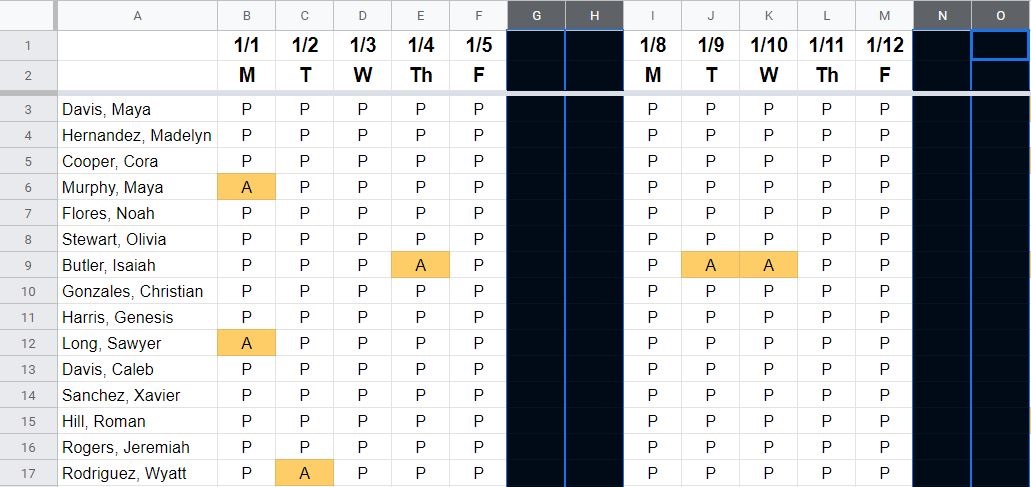
After completing the steps listed above, your spreadsheet will look like the image shown below, where the columns that represent Saturdays and Sundays (G, H, N, and O), are much more narrow than the other columns.
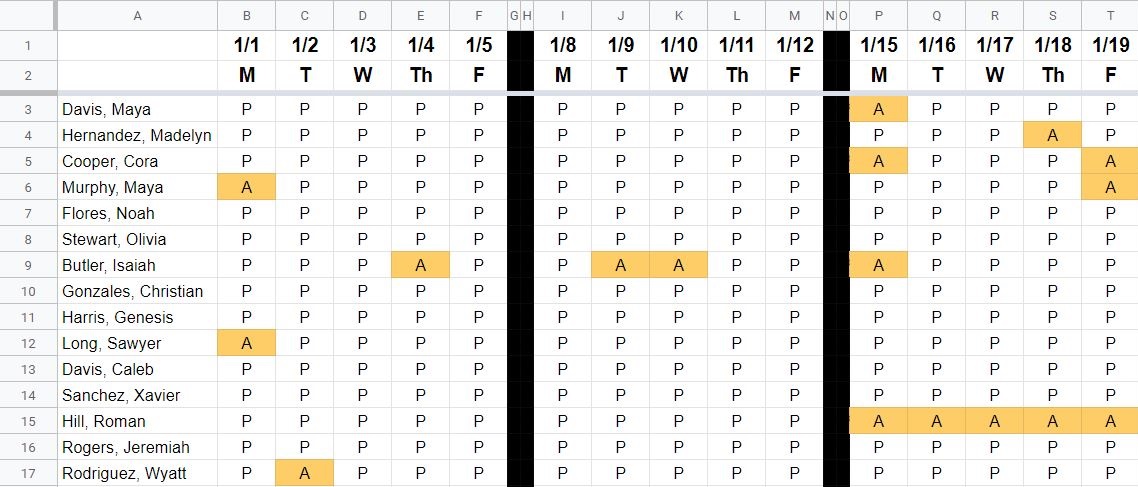
Now you will be able to quickly and very easily adjust the size of multiple columns in your Google spreadsheet so that they are the same width, which will make many of your projects go much faster! Whether you simply want to make each column the same because the sizes became mismatched after using it… or if you have a specific size that you want all of them to be, now you know how to make them all the same, for any size you want.
Pop Quiz: Test your knowledge
Answer the questions below about making columns the same width in Google Sheets, to refine your knowledge! Scroll to the very bottom to find the answers to the quiz.
Question #1
True or false: To make columns the same width in Google Sheets, you can select multiple columns and use the click and drag method, or you can select multiple columns then right-click and set the specific column width.
- True
- False
Question #2
True or false: You cannot make multiple non-adjacent columns the same width at the same time
- True
- False
Question #3
True or false: When adjusting the width of multiple columns at once, the columns can be expanded or they can be narrowed
- True
- False
Question #4
Which of the following keyboard shortcuts will select all columns?
- Ctrl + Z
- Shift + A
- Ctrl + A
Question #5
True or false: When multiple columns are selected and you click and drag to adjust the width of a column, all of the selected columns will adjust to the same width
- True
- False
Answers to the questions above:
Question 1: 1
Question 2: 2
Question 3: 1
Question 4: 3
Question 5: 1

